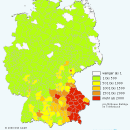 |
Origin of the German and Austrian surname Gruber
The name Gruber is a moderately popular surname in Germany and the most common surname in Austria. It is, in one way or another, derived (...)
August 15, 2016 – Jakub Marian – German
|
 |
Difference between “ausdrucken” and “ausdrücken” in German
The verbs “drucken” and “drücken” in German are often confused by non-native speakers, especially by those who cannot pronounce the vowel (...)
May 27, 2016 – Jakub Marian – German
|
 |
Is German an SVO language?
The order of the subject, verb, and object in a sentence (abbreviated S, V, and O, respectively) is one of the ways linguists categorize (...)
May 22, 2016 – Jakub Marian – German
|
 |
‘Musste’, ‘gemusst’ and ‘müssen haben’ in German
There are four different past tense forms for the German verb müssen (must). The easiest one to deal with is the simple past:
Er (...)
April 24, 2016 – Jakub Marian – German
|
 |
German suffix -anz: feminine nouns
To say that all German nouns ending with “anz” are feminine would be inaccurate, but there is a grain of truth in that. All German nouns (...)
July 2, 2015 – Jakub Marian – German
|
By the way, have you already seen my brand new web app for non-native speakers of English? It's based on reading texts and learning by having all meanings, pronunciations, grammar forms etc. easily accessible. It looks like this:
 |
Words ending with -ung are feminine in German
There are over 20,000 nouns in German that end with -ung, so if there is a rule that applies to them all, it is definitely worth learning. (...)
May 3, 2015 – Jakub Marian – German
|
 |
German suffix -ant: masculine nouns
There are over 300 nouns in German that end with “ant”, and almost all of them are masculine (i.e. they have the article “der”), such (...)
May 1, 2015 – Jakub Marian – German
|
 |
Nouns ending with -heit and -keit in German
All German nouns that have the suffix -heit or -keit are feminine (i.e. have the article die), without exception (which is something we (...)
April 25, 2015 – Jakub Marian – German
|
A small but necessary interruption: This website does not contain any ads and is completely dependent on the support of its readers. If you enjoy reading articles here, please, consider helping by using my web app for English learners.
 |
German ä, ö, ü – what’s the difference?
German alphabet contains three additional symbols for vowels, which are often misunderstood or mispronounced by learners whose mother (...)
January 18, 2015 – Jakub Marian – German
|
 |
Difference between -ung in German and -ing in English
One of the most common mistakes among German learners who just started off is overuse of the German ending -ung, which looks like the (...)
January 8, 2015 – Jakub Marian – German
|

